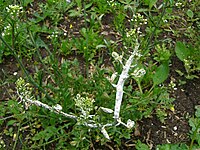
Photo from wikipedia
Significance Most plants resist most plant pathogens. Barley resists wheat-infecting powdery mildew races (and vice versa), and both barley and wheat resist potato late blight. Such “nonhost” resistance could result… Click to show full abstract
Significance Most plants resist most plant pathogens. Barley resists wheat-infecting powdery mildew races (and vice versa), and both barley and wheat resist potato late blight. Such “nonhost” resistance could result because the pathogen fails to suppress defense or triggers innate immunity due to failure to evade detection. Albugo candida causes white rust on most Brassicaceae, and we investigated Arabidopsis NHR to Brassica-infecting races. Transgressive segregation for resistance in Arabidopsis recombinant inbred lines revealed genes encoding nucleotide-binding, leucine-rich repeat (NLR) immune receptors. Some of these NLR-encoding genes confer resistance to white rust in Brassica sp. This genetic method thus provides a route to reveal resistance genes for crops, widening the pool from which such genes might be obtained. Arabidopsis thaliana accessions are universally resistant at the adult leaf stage to white rust (Albugo candida) races that infect the crop species Brassica juncea and Brassica oleracea. We used transgressive segregation in recombinant inbred lines to test if this apparent species-wide (nonhost) resistance in A. thaliana is due to natural pyramiding of multiple Resistance (R) genes. We screened 593 inbred lines from an Arabidopsis multiparent advanced generation intercross (MAGIC) mapping population, derived from 19 resistant parental accessions, and identified two transgressive segregants that are susceptible to the pathogen. These were crossed to each MAGIC parent, and analysis of resulting F2 progeny followed by positional cloning showed that resistance to an isolate of A. candida race 2 (Ac2V) can be explained in each accession by at least one of four genes encoding nucleotide-binding, leucine-rich repeat (NLR) immune receptors. An additional gene was identified that confers resistance to an isolate of A. candida race 9 (AcBoT) that infects B. oleracea. Thus, effector-triggered immunity conferred by distinct NLR-encoding genes in multiple A. thaliana accessions provides species-wide resistance to these crop pathogens.
Journal Title: Proceedings of the National Academy of Sciences of the United States of America
Year Published: 2019
Link to full text (if available)
Share on Social Media: Sign Up to like & get
recommendations!